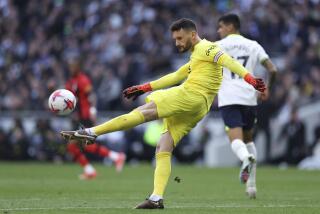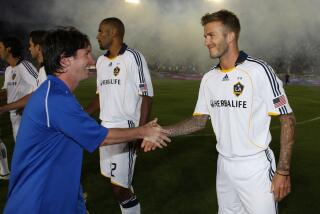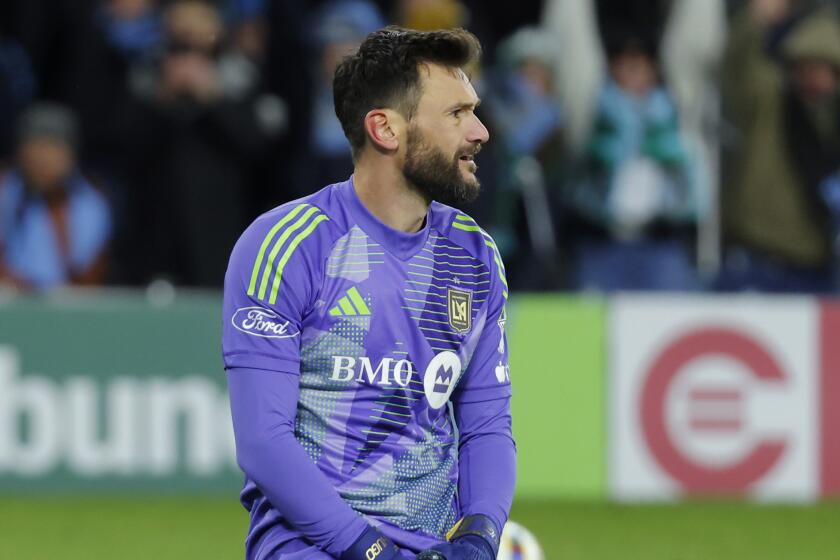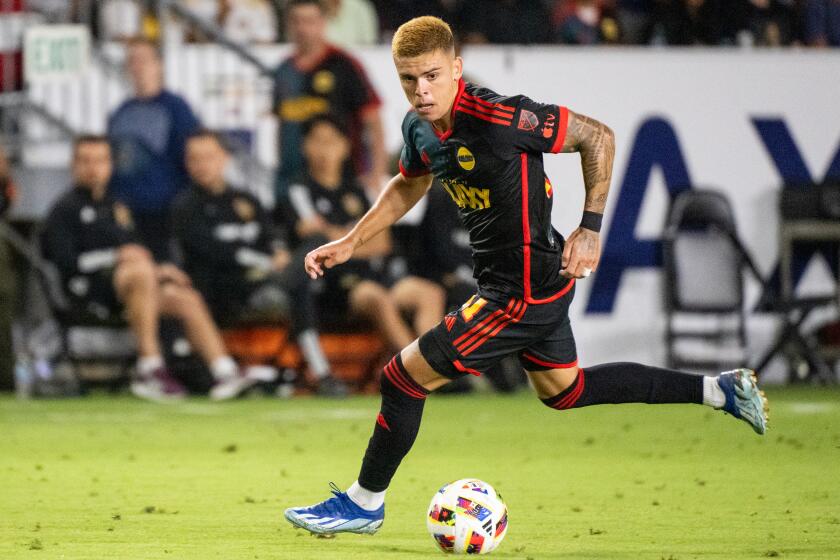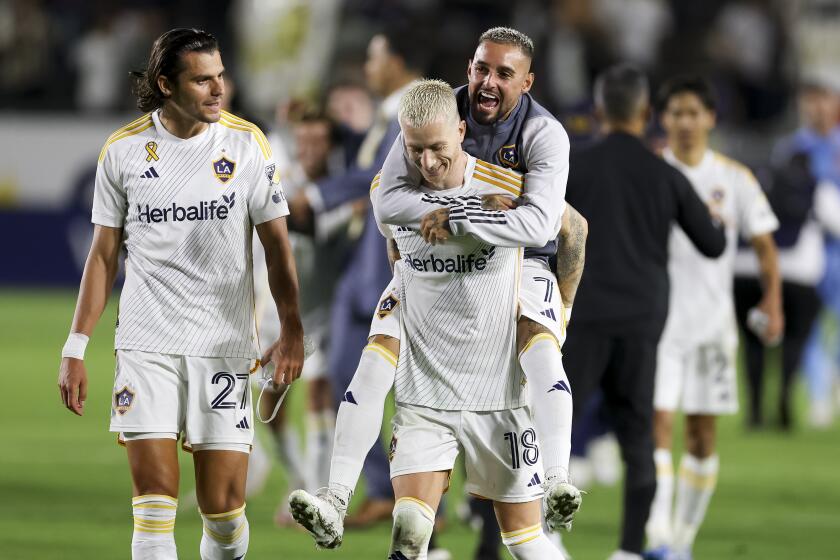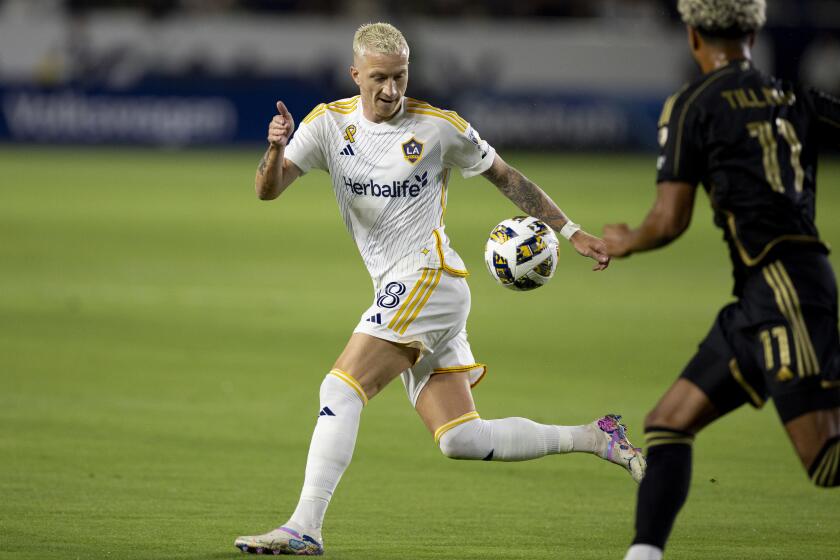Soccer is uniting South Africans
When Emma Jordi’s mother suggested a Sunday afternoon at South Africa’s Confederations Cup watching the national soccer team play Iraq, the pretty blond 14-year-old had an excuse. Homework.
“I have to write a speech for English,” she said warily, more accustomed to riding her beautiful chestnut gelding, Spring Close Prince Dante, than spending rowdy afternoons at the soccer stadium, the air rent by the blasts of plastic trumpets called vuvuzelas that fans blow.
South Africa’s team, Bafana Bafana (The Boys the Boys) may be mediocre at best. And soccer may still be perceived by some white South Africans as a blacks’ game, second to rugby, the sport that whites tend to play and watch.
But Jane Jordi, the mom, was determined to take her family, which is white, to support Bafana Bafana in the FIFA Confederations Cup, widely seen as a dry run for South Africa’s hosting of the World Cup next year.
“It was a South African event, so it was that patriotic feeling that was the original thing,” said Jordi, who is “not a soccer person” but bought tickets months ago. “I just like watching the play and the crowd interaction. I wanted to go for the game and for the atmosphere, so I bought the cheapest tickets because I wanted to be with the ordinary South Africans. We had a huge amount of fun.”
Soccer tends to be more fraught with controversy than any other South African sport. Partly it’s the racial undercurrents in a country where divisions persist 15 years after the first democratic elections ushered in black majority rule. And partly it’s the persistent doubters, who claim South Africa’s World Cup will be either a flop or a disaster.
Bafana Bafana’s lackluster performance doesn’t help, nor does its members’ habit of demanding big bonuses on the eve of important matches, as they did recently. In one online poll about whether the team would make it to the semifinals, nearly 60% gave it no chance. Just 6%, the hard-core supporters, expect it to win the final.
On Wednesday, South Africa was able to pull off a victory, beating New Zealand, 2-0. A good thing too: After Sunday’s 0-0 draw against Iraq, sportswriter Nkareng Matshe had written of the New Zealand game in Tuesday’s Star newspaper that “defeat, or even another draw, would be a national catastrophe.”
South African politicians tend to burden the sport with overblown expectations. A spokesman for the South African Young Communist League, Castro Ngobese, recently called on Bafana Bafana to “apply militancy and radicalism” to its play -- whatever that meant.
But to the newcomers who came to support their team for the first time Sunday, none of that mattered. To Emma, her brother Alex, 12, and a family friend, Max Coleman, 8, figuring out how to get sound out of a vuvuzela was more important than who won or lost. They got some advice on how to blow their vuvuzelas from a young black fan.
They sat amid a sea of blacks, many of whom took photos of the family.
“I felt excited and happy,” said Alex Jordi, who plays soccer at school. “I felt proud.” Most of all, he loved being part of the crowd. “They were friendly. They sing, and they support their team.”
Sunday was Emma’s first soccer match. “I thought it would be really boring and that it was going to be poorly organized,” she said, explaining why she initially preferred the idea of doing homework. “But I felt really safe and proud of South Africa and what they’d done.”
The Jordis and Max were taken aback at what sounded like boos every time the lone white South African player got near the ball.
“A young black guy sitting behind us, about 20 years old, explained to us that it wasn’t that people were booing. He said, ‘People are shouting out his name, and his name is Booth,’ ” said Jane Jordi.
Anthony Prangley, a 32-year-old white, got tickets for all the main games as soon as they went on sale, even though he rarely watches soccer.
“I’m really passionate about the potential of these big events to unite South Africans,” he said. “It was an incredible spirit. It was a very multiracial crowd.”
For him and many others, the best moment Sunday was when the anthem “Shosholoza” rose above the stadium in Johannesburg. The Zulu song, meaning “Push forward,” was once sung by black workers.
“I have never heard such a stirring rendition of ‘Shosholoza,’ ever. To hear the song reverberating across the stadium was very moving,” Prangley said. Despite a few organizational glitches -- the food and beer ran out -- he said the event succeeded in uniting the crowd.
“There was both class and race united behind their country. I found the whole energy of the crowd amazing,” he said.
To Jane Jordi, the team’s performance didn’t matter as much as that sense of unity: “I didn’t feel white. I just looked white,” she said. “It made me feel that South Africa would be able to host something absolutely amazing” next year.
Emma Jordi’s verdict about Sunday’s match? “I loved it! I felt quite disappointed that we didn’t win. But I was really glad we didn’t lose.”
--
